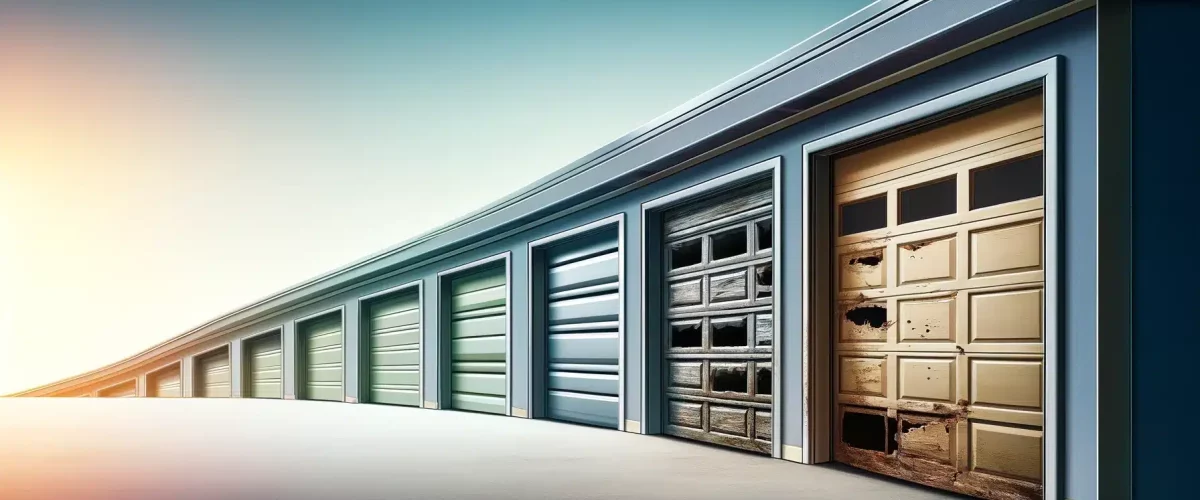Did you know that the lifespan of garage door springs, the crucial component supporting the weight of the door, is only about 18 months with regular usage? That’s right, those springs that silently help you open and close your garage door have a shorter lifespan than you might expect. However, the actual lifespan can vary depending on factors such as the type of spring and its quality.
At Garage Door Pros, we understand the importance of garage door repair and maintenance, which is why we’re here to guide you through the lifecycle of your garage door and the signs that indicate repairs are needed. From the different types and functions of garage door springs to the factors that can impact their lifespan, we have the knowledge and expertise to help you keep your garage door in optimal condition.
Types and Functions of Garage Door Springs
When it comes to garage door springs, there are two main types that you should be familiar with: extension springs and torsion springs. Each type serves a unique function and is suited for different garage door systems.
Extension Springs
Extension springs are commonly found in older garage door systems or doors with lower weight requirements. These springs work by stretching or extending when the door closes and contracting as the door opens. They are typically mounted parallel to the horizontal tracks on both sides of the garage door.
Extension springs are designed to counterbalance the weight of the door as it opens and closes. They store and release energy to assist in the smooth operation of the door. While they offer a cost-effective solution for lighter garage doors, it’s important to note that dealing with extension springs can be dangerous due to the high tension involved.
Torsion Springs
Torsion springs are commonly used in modern residential garage doors. Unlike extension springs, they work by twisting or coiling around a shaft situated above the door opening. When the door is closed, the springs store energy in this twisted state, which helps counterbalance the weight of the door during opening.
Torsion springs provide several advantages compared to extension springs. They offer smoother operation, improved control over the movement of the garage door, and increased durability. Additionally, torsion springs can be customized to match the specific weight and size requirements of different garage doors.
Dealing with garage door springs can be dangerous, especially due to the high tension involved. It’s always recommended to seek professional help for any maintenance, repair, or replacement needs.
In summary, understanding the types and functions of garage door springs is essential for homeowners. Extension springs are suitable for older or lighter garage doors, while torsion springs offer enhanced performance for modern residential doors. By being knowledgeable about these springs and their characteristics, you can make informed decisions regarding your garage door system.

Factors Affecting the Lifespan of Garage Door Springs
The lifespan of garage door springs can be influenced by various factors, which homeowners should consider to ensure optimal performance and longevity. Understanding these factors can help you make informed decisions about maintenance and repairs for your garage door.
Type of Spring
The type of spring used in your garage door is a crucial factor that affects its lifespan. Different types of springs offer varying lifespans based on their design and construction. For instance, standard manufacturer springs typically have an average lifecycle of about 10,000 cycles, while oil-tempered springs can last for about 15,000 cycles.
“Canadoor Powder-coated Lifetime springs outperform other springs, boasting an impressive rated lifespan of up to 80,000 cycles.” – Garage Door Experts
Usage of the Garage Door
The frequency and intensity of garage door usage directly impact the lifespan of its springs. Regular daily usage, such as opening and closing the door multiple times throughout the day, will naturally wear out the springs faster compared to infrequent use. If your garage door experiences heavy usage due to multiple vehicles or regular deliveries, it may require more frequent inspections and maintenance.
Proper Maintenance
Regular maintenance is crucial for maximizing the lifespan of garage door springs. One key maintenance practice is regular lubrication every three months. This helps reduce friction and wear on the springs, extending their lifespan. Additionally, periodic visual inspections to identify any signs of wear or damage can help you address issues before they escalate and cause further damage.
Weight of the Garage Door
The weight of your garage door has a significant impact on the stress placed on the springs. Heavier doors exert more force on the springs, potentially shortening their lifespan. It’s important to ensure that the springs are correctly calibrated and matched to the weight of the door to prevent premature wear and failure.
- Types of springs
- Usage frequency
- Proper maintenance
- Weight of the door
By considering these factors and implementing regular maintenance practices, you can prolong the life of your garage door springs and ensure smooth and reliable operation of your garage door.
Trust your Garage Door Expert
In conclusion, understanding the lifecycle of a garage door and recognizing the signs for repairs is crucial for homeowners. The type of garage door springs, such as extension springs or torsion springs, greatly influences their durability and functionality. The lifespan of these springs is affected by factors like the type of spring, usage frequency, regular maintenance, and the door’s weight.
Routine maintenance tasks, including lubrication and visual inspections, can extend the life of garage door springs and ensure their optimal performance. However, the appearance of wear and tear, movement issues, rising energy costs, or the wish to upgrade the home’s aesthetic might signal the need for a garage door replacement.
For those contemplating a garage door replacement, it is vital to seek advice from a professional. At Garage Door Pros, we offer expert guidance and high-quality replacement services to ensure your satisfaction. Remember, the average garage door opener has a lifespan of about 10-15 years, and upgrading to a newer model can provide advanced features and better convenience.
For homeowners in Canada, timely repairs and considering a replacement when necessary are key to enhancing the longevity and efficiency of their garage door systems, ensuring both security and peace of mind. Contact Garage Door Pros today for professional assistance and make the most of your garage door investment.

